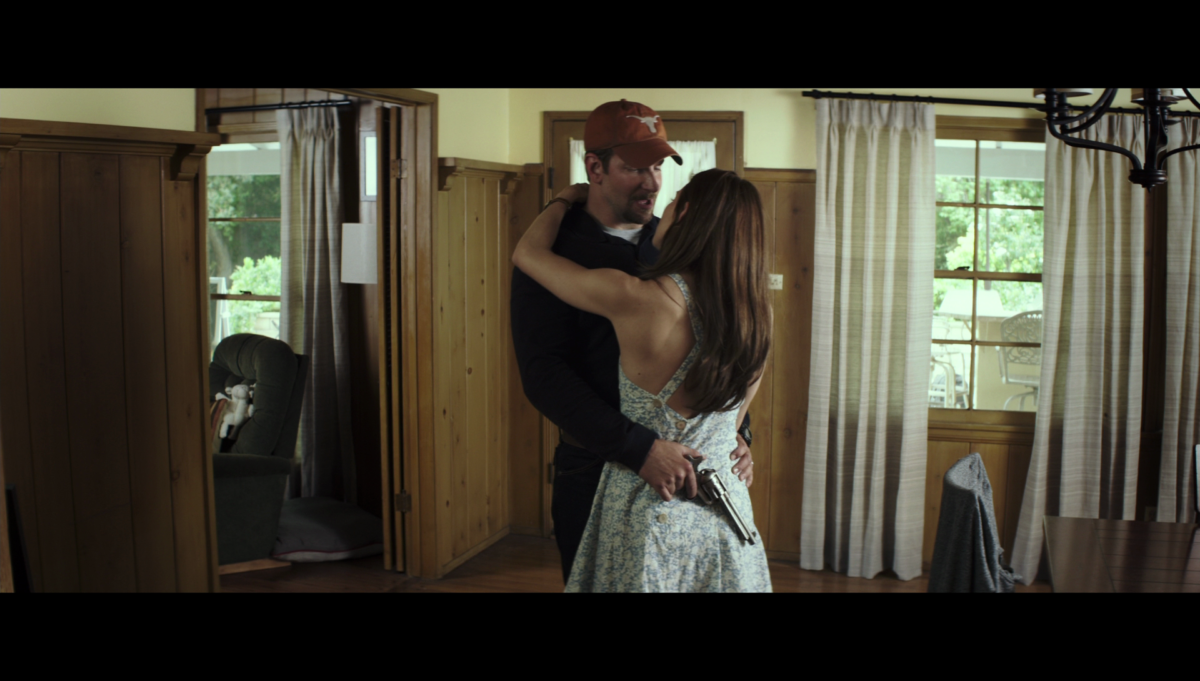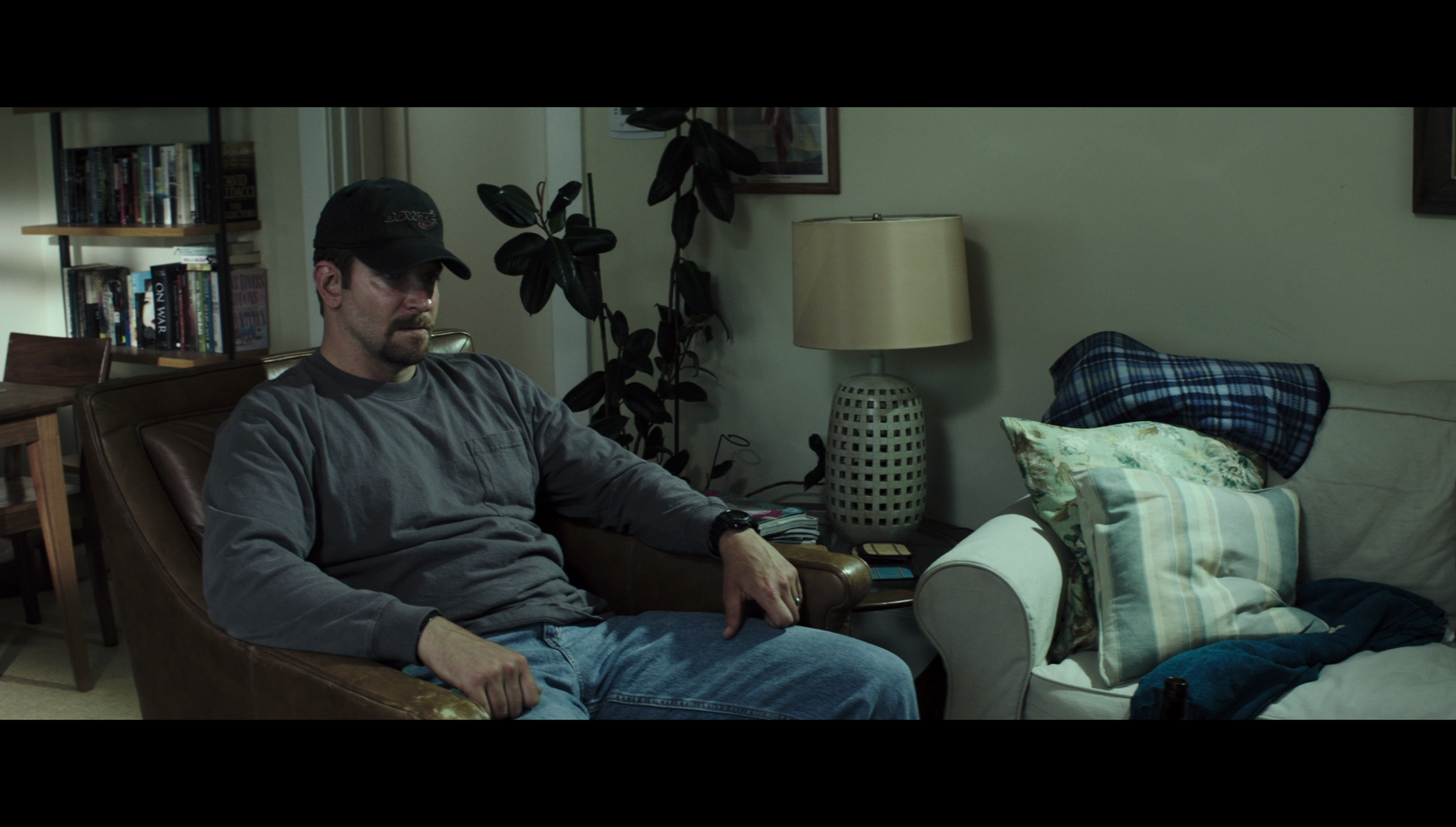Last Updated on January 23, 2021 by rob
Chris Kyle (Bradley Cooper), a US Navy SEAL, finds himself torn between two families; his wife Taya (Sienna Miller) who finds herself raising their son and daughter alone and the battlefield comrades who rely on his shooting skills to protect them from a legendary enemy sniper known as Mustafa during four gruelling tours of duty in Iraq. But after an ultimatum from Taya results in Chris coming home for good his desire to help fellow service members finds an outlet in assisting vets with PTSD.
Some Eastwood fans like to complain about how their hero hasn’t made a Western since 1992’s Unforgiven. Well those people should be very happy with American Sniper, a film infused with the sensibilities (not the least of which is the recreation of that iconic image of John Wayne framed in the doorway from the end of The Searchers) of the Ford/Hawks Westerns Eastwood so admires. Yet this is also a touching portrait of both a distinctive breed of American patriot (one that Hawks and Ford would instantly recognise) with something newer; a subtle, affecting and entirely non-melodramatic portrait of the PTSD syndrome which plagues so many combat vets on their attempt to assimilate back into civilian life. Bradley Cooper, massively bulked up here, with bushy beard and a convincing Texas accent, is both superb and quite unrecognisable as Chris Kyle, a good ol’ boy whose 1990’s dreams of becoming a cowboy are sidelined by his anger at the news footage of American embassies being bombed overseas.
By the time 9/11 happens Kyle’s made it into the SEALS, just gotten married to Taya (a very good Sienna Miller whose chemistry with her co-star is so natural you never once question their pairing as a couple) and then it’s off to Fallujah and the first of four relentlessly taut, harrowing and stunningly staged combat tours in which Kyle’s eye for a long-distance target makes him a natural as one of the snipers tasked with protecting his buddies on the ground. Pretty soon Kyle’s unmatched ability to kill, whether it be kids, women or military age males, means the insurgents have put a huge bounty on his head, the hunt for the feared Islamist militant Zarqawi and his henchman known (with frighteningly good cause) as The Butcher goes disastrously wrong, there’s an enemy sniper named Mustafa who’s almost as good as Kyle and out to take him down, and Kyle’s all too brief trips home mean he’s practically a stranger in his own house (the film’s elision of time here – the way Kyle’s kids morph from babies to toddlers and then infants over the course of his four tours – is weird and unsettling) and the sheer psychological strain on Kyle, plus his inability to let go of his concern for his comrades, drives he and Taya’s marriage to breaking point. That is until an unexpected solution presents itself.
Jason Hall’s screenplay derives considerable power both from its conception as a Western and the way the film forces us to perceive events entirely from Kyle’s perspective. The immense psychological stress experienced by Kyle is primarily communicated through his body language and especially his eyes, and poignantly offset by the sheer size of the man (honestly, Cooper is huge in this). An old Ennio Morricone Western score is also heartbreakingly utilised and the emotional beats are defined by Eastwood’s habit of leaning back from – rather than into – them, and thus there’s a sense that nowhere in the movie are you being fed a line of crap. In short, there’s an emotional authenticity here that transcends any liberal certitudes about the Iraq war being wrong, about the troops being kill crazy murderers, or about Bush being a war criminal. Such liberal pieties are simply not on the table and yet the film is subtly questioning of Chris’s values.
At one point a fellow SEAL asks Kyle if the Bible he carries around is for show. ‘It’s just – I’ve never seen you read it’ says the man. After that same man is killed by insurgents Kyle blames a letter the man wrote – in which he hinted at reservations about the war – as the cause of his death. Is that fair comment or the response of a heartless man? And Kyle’s younger brother, clearly shaken at what he’s seen, declares of Iraq, ‘Fuck this place’, a remark which garners incomprehension from Kyle. In these and other instances the film asks you to consider Kyle’s reaction and reach your own judgment as to his nature. As Kyle keeps returning for multiple tours the crystal clear worldview instilled in him as a child by his own father – that people can be divided into three types; sheep, wolves and sheepdogs – appears increasingly blurred and leads to a conclusion so bitterly ironic, of such tragic dimension, that it leaves you stunned into silence.
Over the course of Sniper’s 134 minutes not a single scene feels wasted and the staging of a climactic siege by armed insurgents on the factory rooftop Kyle and his team are stuck on as a massive sandstorm engulfs them, is breathtaking – as remarkable for its visceral intensity as its nervy tension. It’s easily one of the most ambitious sequences Eastwood has ever done. Did I mention he was 84? Astonishing really. The director’s command of cinematic technique is further evidenced in the film’s seamless deployment of CG effects. Not only are most of these unnoticeable but their use is wholly in the service of enhancing and supporting the human drama. I left American Sniper with the feeling I’d seen a film by a master director straight out of the old studio system. It has that surety, that precision and confidence of purpose and above all – that humanism – which I always think marks out the great filmmakers.
It manages to be both patriotic (in its protagonist who staunchly professes his belief in God, Country and Family – literally in that order) while quietly but insistently probing its protagonist’s beliefs, depicting the effect of war not just on Kyle but on his family and his fellow serviceman as they attempt to integrate back into society. The psychological and physical toll all this takes on Kyle, the way ordinary noises can trigger stress, including a brilliant moment where the sound of combat – gunfire, screams, explosions – play on the soundtrack as the camera slyly dollies around Kyle sitting in his front room to reveal the tv set not even on, startlingly conveys what these men carry inside them more indelibly than any other movie I’ve seen. Certainly any Iraq-set movie and as of now American Sniper is, I think, easily the defining cinematic portrait of that conflict.
As you’re probably aware, Eastwood’s blockbuster (over half a billion gross worldwide on a production cost of less than 60 million) inspired an awful lot of commentary – most of it banal beyond belief. There were some gems though including this defence of Chris Kyle from Middle East journalist Michael J. Totten and this review by former Vietnam vet Bob Kerr. Both are well worth reading.



